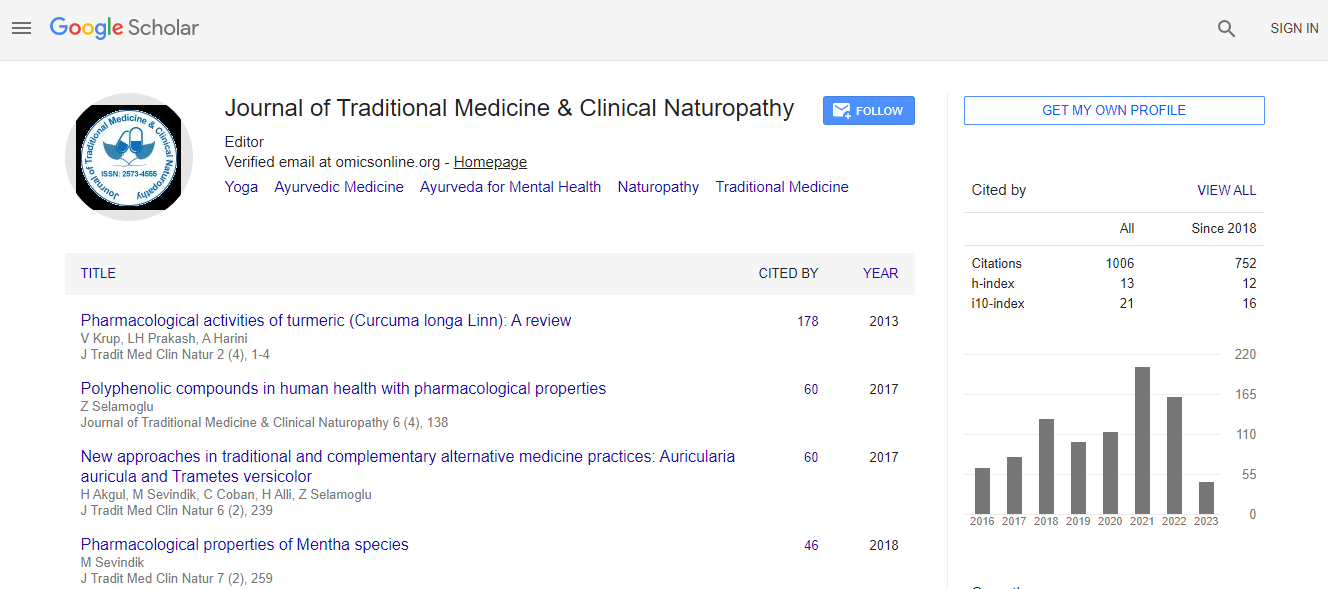Our Group organises 3000+ Global Conferenceseries Events every year across USA, Europe & Asia with support from 1000 more scientific Societies and Publishes 700+ Open Access Journals which contains over 50000 eminent personalities, reputed scientists as editorial board members.
Open Access Journals gaining more Readers and Citations
700 Journals and 15,000,000 Readers Each Journal is getting 25,000+ Readers
Google Scholar citation report
Citations : 1504
Journal of Traditional Medicine & Clinical Naturopathy peer review process verified at publons
Indexed In
- CAS Source Index (CASSI)
- Google Scholar
- Sherpa Romeo
- Open J Gate
- Genamics JournalSeek
- RefSeek
- Directory of Research Journal Indexing (DRJI)
- Hamdard University
- EBSCO A-Z
- Publons
- Geneva Foundation for Medical Education and Research
- Euro Pub
- ICMJE
Useful Links
Recommended Journals
Related Subjects
Share This Page
Literature documentation about the acupuncture for the intractable disease in Japan
6th International Conference and Exhibition on Traditional & Alternative Medicine
Soichiro Kaneko, Shin Takayama, Takehiro Numata , Natsumi Saito, Yuka Ikeno, Minoru Ohsawa, Akiko Kikuchi, Tetsuharu Kamiya, Hidekazu Watanabe, Hitoshi Nishikawa, Junichi Tanaka, Hitoshi Kuroda, Michiaki Abe and Tadashi Ishii
Tohoku University Hospital, Japan
ScientificTracks Abstracts: J Tradi Med Clin Natur
Abstract
Background: In Japan, 130 refractory diseases, such as ulcerative colitis and Parkinson��?s disease, are considered intractable. They are defined as (1) diseases with unidentified or undetermined treatments and (2) chronic diseases that have a large economic and mental burden. The number of patients with such diseases has increased approximately 3 times in the last 20 years. Although not completely proven, acupuncture is known to have positive therapeutic effects on intractable diseases. Here, we report the findings of a literature survey on the use of acupuncture for treating intractable diseases. Method: We searched the MEDLINE (for English literature) and Ichushi-Web (for Japanese literature) databases until May 2015, for the keywords ��?acupuncture��? and ��?needle stimulation��? by using the ��?AND��? function to obtain articles on intractable diseases in Japan. Results: Our search yielded 453 articles on MEDLINE and 482 on Ichushi-Web. Our analysis showed that Parkinson��?s disease was the most frequently studied intractable disease, followed by multiple sclerosis and ulcerative colitis. While 6 meta-analyses and 19 randomized controlled trials were included in MEDLINE, most reports in Ichushi-Web were conference minutes. Moreover, the number of MEDLINE articles on intractable diseases gradually increased over the years. However, our search yielded only 6 articles by Japanese authors. Discussion: Most reports on the use of acupuncture for treating intractable diseases in Japan were case reports and conference minutes, and there was a dearth of original articles. We think it is necessary to publish original articles to introduce Japanese acupuncture to the world.Biography
Soichiro Kaneko acquired license of Acupuncture in Japan and has completed his PhD from Tohoku University. After that, he studied about Acupuncture and Kampo Medicine in Tohoku University Hospital.

 Spanish
Spanish  Chinese
Chinese  Russian
Russian  German
German  French
French  Japanese
Japanese  Portuguese
Portuguese  Hindi
Hindi 
